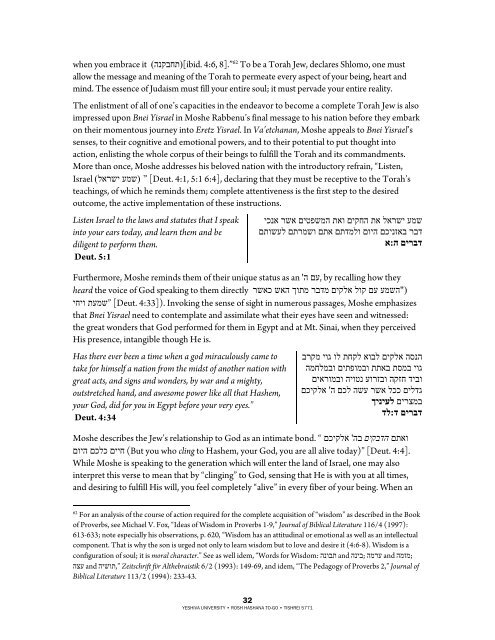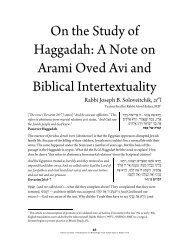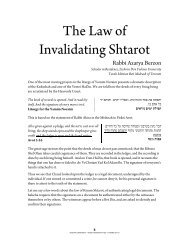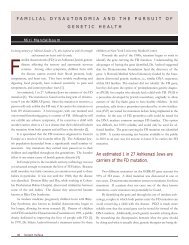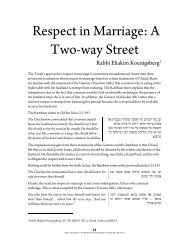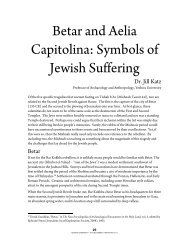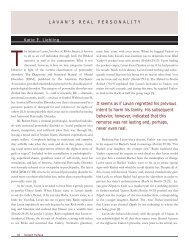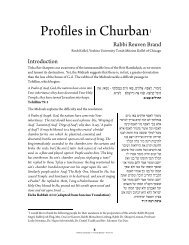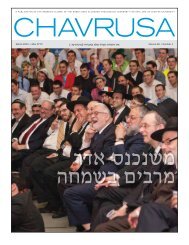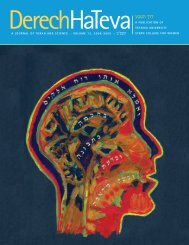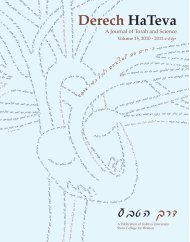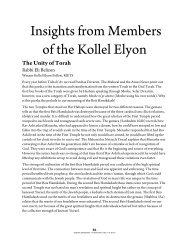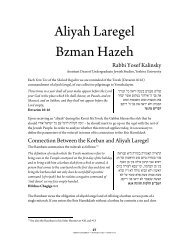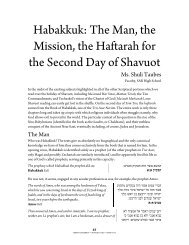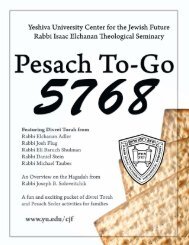YESHIVA UNIVERSITY • ROSH HASHANA TO-GO ... - YUTorah.org
YESHIVA UNIVERSITY • ROSH HASHANA TO-GO ... - YUTorah.org
YESHIVA UNIVERSITY • ROSH HASHANA TO-GO ... - YUTorah.org
You also want an ePaper? Increase the reach of your titles
YUMPU automatically turns print PDFs into web optimized ePapers that Google loves.
when you embrace it ( הנקבחת)<br />
[ibid. 4:6, 8].” 62 To be a Torah Jew, declares Shlomo, one must<br />
allow the message and meaning of the Torah to permeate every aspect of your being, heart and<br />
mind. The essence of Judaism must fill your entire soul; it must pervade your entire reality.<br />
The enlistment of all of one’s capacities in the endeavor to become a complete Torah Jew is also<br />
impressed upon Bnei Yisrael in Moshe Rabbenu’s final message to his nation before they embark<br />
on their momentous journey into Eretz Yisrael. In Va’etchanan, Moshe appeals to Bnei Yisrael’s<br />
senses, to their cognitive and emotional powers, and to their potential to put thought into<br />
action, enlisting the whole corpus of their beings to fulfill the Torah and its commandments.<br />
More than once, Moshe addresses his beloved nation with the introductory refrain, “Listen,<br />
Israel ( לארשי עמש)<br />
ׁ”<br />
[Deut. 4:1, 5:1 6:4], declaring that they must be receptive to the Torah’s<br />
teachings, of which he reminds them; complete attentiveness is the first step to the desired<br />
outcome, the active implementation of these instructions.<br />
Listen Israel to the laws and statutes that I speak<br />
into your ears today, and learn them and be<br />
diligent to perform them.<br />
Deut. 5:1<br />
32<br />
<strong>YESHIVA</strong> <strong>UNIVERSITY</strong> <strong>•</strong> <strong>ROSH</strong> <strong>HASHANA</strong> <strong>TO</strong>-<strong>GO</strong> <strong>•</strong> TISHREI 5771<br />
יכנא רשא םיטפשמה תאו םיקחה תא לארשי עמש<br />
םתושעל םתרמשו םתא םתדמלו םויה םכינזאב רבד<br />
א:<br />
ה םירבד<br />
Furthermore, Moshe reminds them of their unique status as an ' ה םע,<br />
by recalling how they<br />
heard the voice of God speaking to them directly רשאכ שאה ךותמ רבדמ<br />
םיקלא לוק םע עמשה")<br />
יחיו תעמש” [Deut. 4:33]). Invoking the sense of sight in numerous passages, Moshe emphasizes<br />
that Bnei Yisrael need to contemplate and assimilate what their eyes have seen and witnessed:<br />
the great wonders that God performed for them in Egypt and at Mt. Sinai, when they perceived<br />
His presence, intangible though He is.<br />
Has there ever been a time when a god miraculously came to<br />
take for himself a nation from the midst of another nation with<br />
great acts, and signs and wonders, by war and a mighty,<br />
outstretched hand, and awesome power like all that Hashem,<br />
your God, did for you in Egypt before your very eyes.”<br />
Deut. 4:34<br />
ברקמ יוג ול תחקל אובל םיקלא הסנה<br />
המחלמבו םיתפומבו תתאב תסמב יוג<br />
םיארומבו היוטנ עורזבו הקזח דיבו<br />
םכיקלא 'ה<br />
םכל השע רשא לככ םילדג<br />
ךיניעל םירצמב<br />
דל:<br />
ד םירבד<br />
Moshe describes the Jew’s relationship to God as an intimate bond. “ םכיקלא 'הב<br />
םיקבדה םתאו<br />
םויה םכלכ םייח (But you who cling to Hashem, your God, you are all alive today)” [Deut. 4:4].<br />
While Moshe is speaking to the generation which will enter the land of Israel, one may also<br />
interpret this verse to mean that by “clinging” to God, sensing that He is with you at all times,<br />
and desiring to fulfill His will, you feel completely “alive” in every fiber of your being. When an<br />
62 For an analysis of the course of action required for the complete acquisition of “wisdom” as described in the Book<br />
of Proverbs, see Michael V. Fox, “Ideas of Wisdom in Proverbs 1-9,” Journal of Biblical Literature 116/4 (1997):<br />
613-633; note especially his observations, p. 620, “Wisdom has an attitudinal or emotional as well as an intellectual<br />
component. That is why the son is urged not only to learn wisdom but to love and desire it (4:6-8). Wisdom is a<br />
configuration of soul; it is moral character.” See as well idem, “Words for Wisdom: הנובת and הניב; המרע and המזמ;<br />
הצע and הישות,” Zeitschrift fϋr Althebraistik 6/2 (1993): 149-69, and idem, “The Pedagogy of Proverbs 2,” Journal of<br />
Biblical Literature 113/2 (1994): 233-43.


